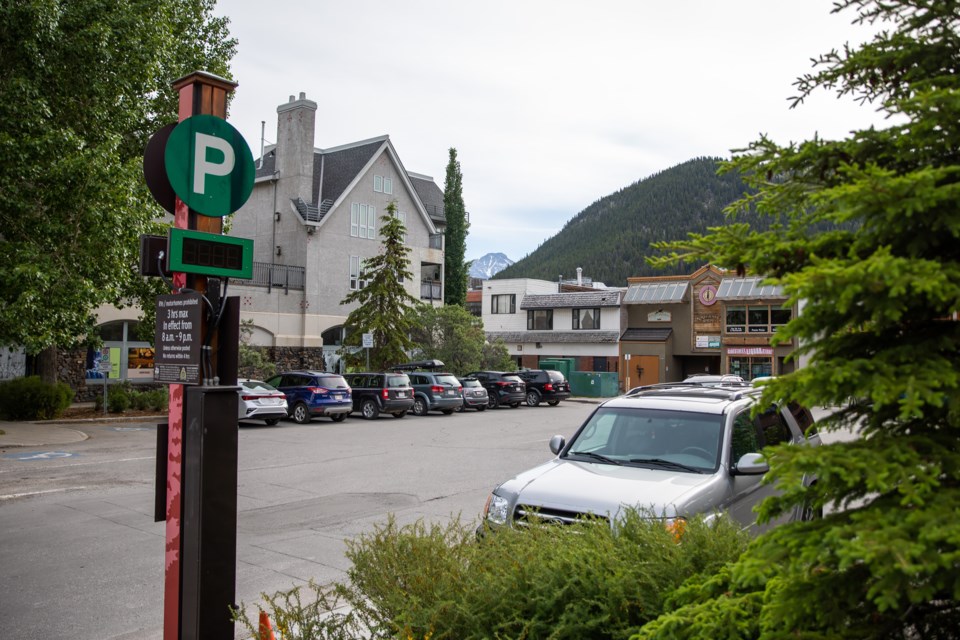BANFF – A new report calls on any surplus revenues from visitor paid parking to be reinvested into the downtown core or used to offset municipal taxes for nearby businesses.
The report by Nichols Applied Management, which was commissioned by Banff and Lake Louise Hospitality Association (BLLHA), explores municipal policy options that could support local businesses through recovery from the COVID-19 pandemic.
The authors note the principle of using prices to control demand, for example for parking, is sound; however, best practice would be to re-invest revenues in projects like beautification or improved sanitation that serve to benefit the specific geographic area from which they are collected.
“In the unique instance of the economic impacts arising from the pandemic, the duration of which are unclear, excess parking revenues could be temporarily designated to help offset taxes levied on nearby businesses,” recommends the report.
The Town of Banff introduced visitor pay parking in the downtown core in July 2021. It costs $3 per hour in summer from May 1 to Oct. 31 and drops to $2 per hour in winter.
Banff residents who have a parking permit can park for free for up to three hours per day in the paid zone, if they have registered their licence plates.
For businesses operating within a paid parking area, BLLHA officials say the full cost to the customer of delivering a product or service experience – for example, provision of parking for their vehicle – may need to be reflected in the overall price of goods and services they sell.
“In the current and unique situation of the pandemic – where businesses have been under intense financial pressure – BLLHA believes the Town could look to provide relief to affected businesses,” said Darren Reeder, BLLHA’s executive director.
Likewise, if excess tax revenues could be re-invested in a program that improved the appeal of attending to the area of paid parking, Reeder said this may also serve to attract and improve the experience for customers of the businesses located there.
“For example, street beautification, more frequent waste collection, public wifi, etc.,” he said in offering up options.
Currently, revenue from the paid parking system in downtown Banff covers the costs of the parking infrastructure and enforcement.
As directed by council in March, any extra revenue from paid parking must be used to fund operating or capital costs related to roadway and parking improvements; transit enhancements; and transportation decarbonization initiatives.
Earlier estimates in the year put net revenues from paid parking at about $1.1 million; however, based on strong visitation this past summer, the Town of Banff expects more revenue than budgeted for in the first year.
Banff’s governance and finance committee will discuss the Town of Banff’s financial plan, which includes a review of policies for various reserves like paid parking, at its meeting on Monday morning (Nov. 8).
In addition, a transportation report will go to council for the afternoon Nov. 8 council meeting, which will include an overview of the visitor pay parking system and the resident parking permit program. This will include a forecast of net revenue from pay parking, after covering costs for all infrastructure and operations.
Mayor Corrie DiManno said council will be exploring several options during the upcoming service review and budget process, adding she is sure recommendations to alleviate business property taxes will be a part of this discussion.
She said Town council has previously set out areas where user pay parking revenues should go, including improving active modes and implementing transportation decarbonization initiatives, and council will review those criteria next week.
“These are very important initiatives, but the affects of the pandemic may require short-term considerations as we begin to build back our economy,” she said.
“I look forward to receiving the net revenue forecasts in a report next week as the starting point for our work to ensure the community gets the best use of the dollars generated from user pay parking.”
Councillor Hugh Pettigrew, whose election campaign called for paid parking revenues to go towards tax stabilization as part of recovery from COVID-19, said he fully intends to provide suggestions on how paid parking revenues could be spent at upcoming meetings.
“I want to wait until I get the information from the report with all the expenditures and revenues on that,” he said.
“But I certainly will be looking at some, if not all of that money, may need to go toward budget stabilization until we get back on firm ground,” he added.
"It’s a council discussion and I will be one voice promoting the idea that we probably need to have a bit more stability in our budget.”




